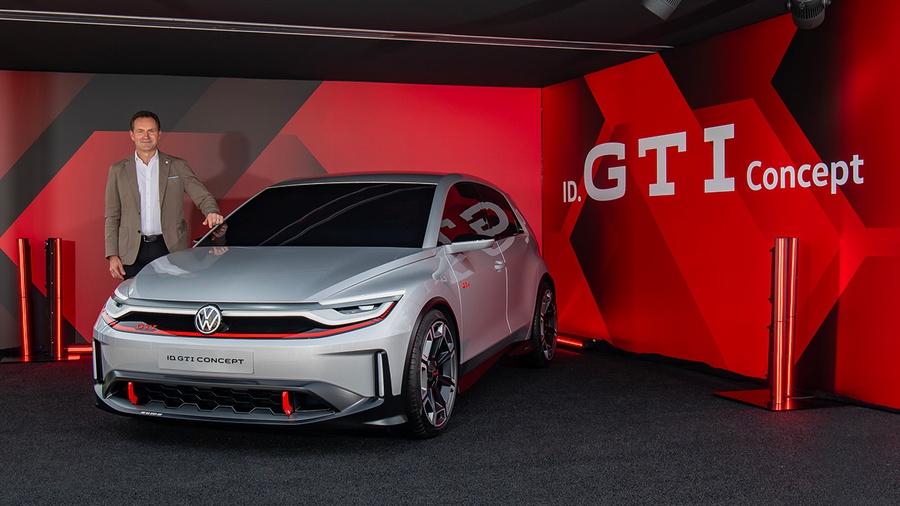The new GTI is based on the ID.2all concept revealed earlier this year, and while VW isn’t talking power figures just yet, we do know that there’s a single, electric motor up front, driving the front wheels through a LSD, just on the current ICE GTI. This time around though, the ‘I’ stands for intelligence, and you don’t need to expend much brain power to know that the hot hatch should serve up more than the 231 hp / 170 kW promised by the original ID.2, which VW said could reach 100 km/h (62 mph) in under 7 seconds.
And that’s not the only reason the GTI will be even better to punt down a twisty road than the stock EV. Drivers can use the new GTI Experience Control on the center console to give their electric hot hatch a synthesized version of the steering, sound and engine characteristics found in historic hot hatches like the 1976 Mk1 GTI or 1986’s rev-hungry 16-valver. It’ll even throw in some fake upshifts.
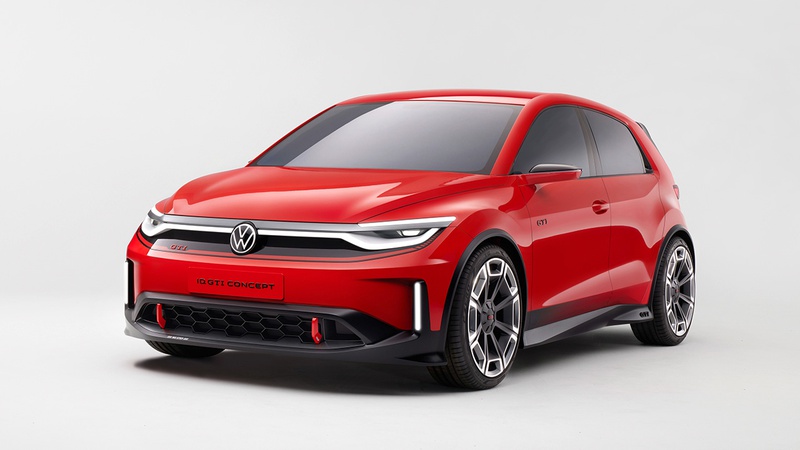
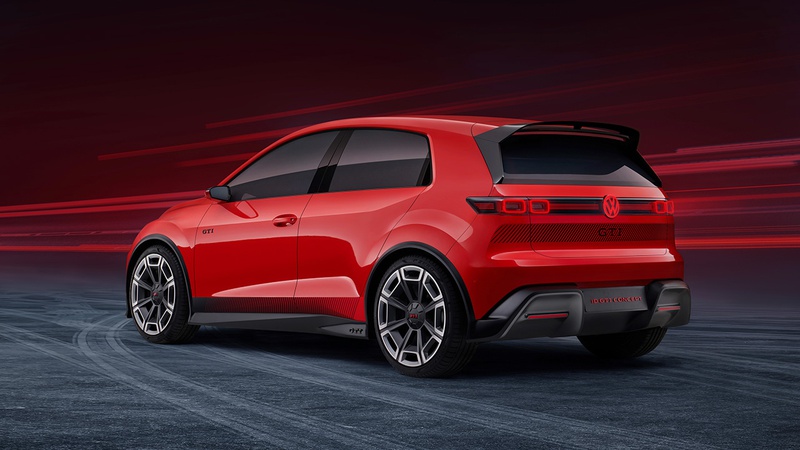



VW ID. GTI Concept
The ID.2all’s designer, VW styling boss Andreas Mindt, says he already had the GTI in mind when he penned the base model. That shows in the strong lines and muscular stance of the ordinary ID2.all, which are enhanced for the GTI by a large hexagon-pattern lower grille in the front bumper, side skirts that twist to replicate the shape of door pressings, arch extensions, a rear spoiler at the trailing edge of the roof and a bigger diffuser section in the rear bumper.
There are GTI badges on the nose, doors, skirts, wheels and below the VW roundel on the rear hatch, but there are other more subliminal references to classic GTIs, such as the black section in the lower portion of the front bumper that is meant to recall the bolt-on chin spoiler on the original hot Golf.

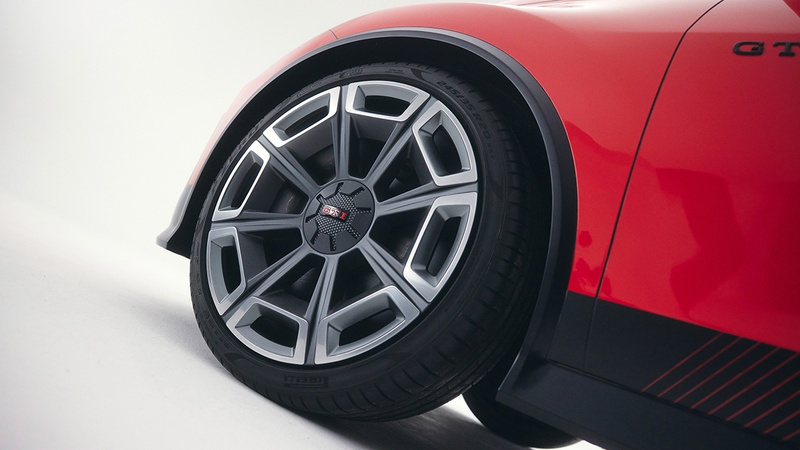


VW ID. GTI Concept
The arch spats, skirts, rear window surround and lower rear bumper sections are all also picked out in black, and together with the segmented stripe below the taillights evoke memories of the black plastic bumpers and trim on Mk1 and early Mk2 Golf GTIs. The nose, meanwhile, gets a tell-tale red stripe on the grille and the 20-inch wheels were clearly inspired by the rims fitted to Golfs and Sciroccos more than 40 years ago. But there are subtle nods to more recent GTi heroes, too: the rear spoiler’s single, center mounting rib echoes the one on the current GTI Clubsport.
Inside, it’s a similar blend of old and new influences. The seat fabric is cheekily named Jack-e, a reference to the plaid Jacky upholstery found in the Mk6 GTI, and the driver’s seat backrest features a pulsing LED heartbeat to let you know when the car is locked. The steering wheel looks even further back, to 1976 and the first Golf GTI, for inspiration for its low-set airbag center, though what buyers back then would have made of the new rim’s flat top and bottom, or the ‘key’ socket in the base of the vertical spoke, we can’t say.
The classic golfball shifter also gets another outing, though because the shift control has moved to the column stalk, like on the ID.7 and new Passat, the golf ball now functions as the GTI Experience Control dial in the center console from which the driver can adjust the driving modes and the look of the digital displays. Select Vintage mode, for instance, and the 10.9-inch digital gauge pack takes on the look of post-facelift Mk1 GTI dash, and the 12.9-inch tablet display – which VW says is close to production-ready, menus and all – gets a visual makeover, too.
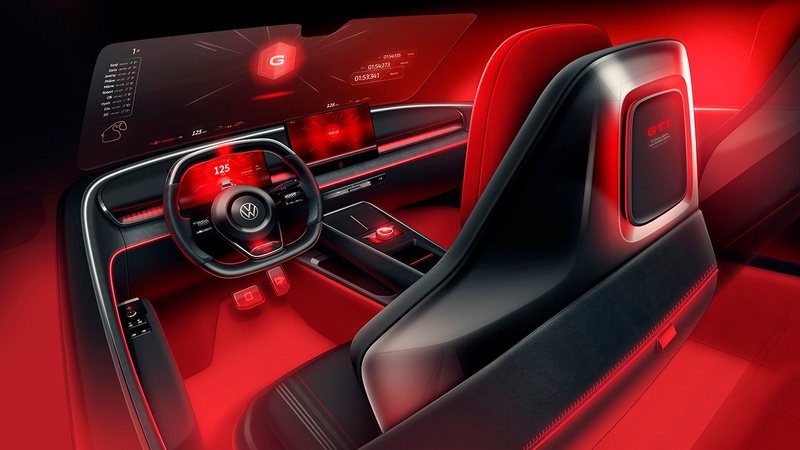

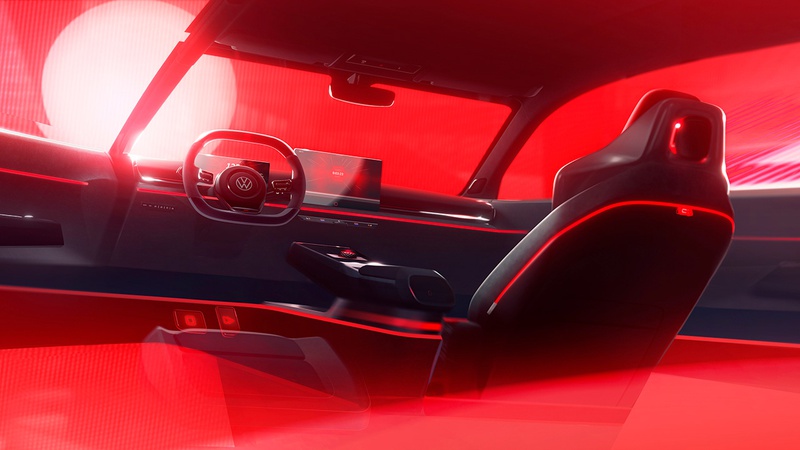

VW ID. GTI Concept
The concept also comes with an advanced augmented reality head-up display that can project information onto the windshield for both driver and passenger to see. Switch to GTI mode and the interior lighting shifts to moody red and, if you happen to be on a racetrack, you’ll get a map of the course, plus your lap data.
We’re as gutted as you to hear that VW has dropped the manual transmission in the Golf GTI, but this concept does at least prove that’s committed to the GTI brand, having previously resurrected the GTX tag for its hotter EVs. Whether it will be able to push the envelope further by adding an R version to the ID.2 lineup is unclear, because unlike the older platform used by the ID.3, which can accommodate a bi-motor setup, the ID.2’s was engineered for front-wheel drive to maximize interior space. The result is a car with a 2,600 mm (102.4-inch) wheelbase that’s as roomy as a Golf while taking up less asphalt than a Polo.
That platform – which will also be used in Skoda and Cupra models – can handle 38 kWh or 56 kWh batteries, neither of which sound that big, but VW says the base ID2.all with the 56 kWh pack is good for WLTP 450 km (280 miles) of electric driving and can draw on 125 kW to charge from 10-80 percent in 20 minutes. Expect the GTI to cover fewer kilometers between top ups, and also to cost significantly more than the roughly €25,000 ($27k) VW is talking about for an entry-level non-GTI ID.2.
According to Volkswagen CEO Thomas Schäfer, a road-going model will debut in 2026 before going on sale at the beginning of 2027.
Source: Volkswagen, Autocar
.jpg)
